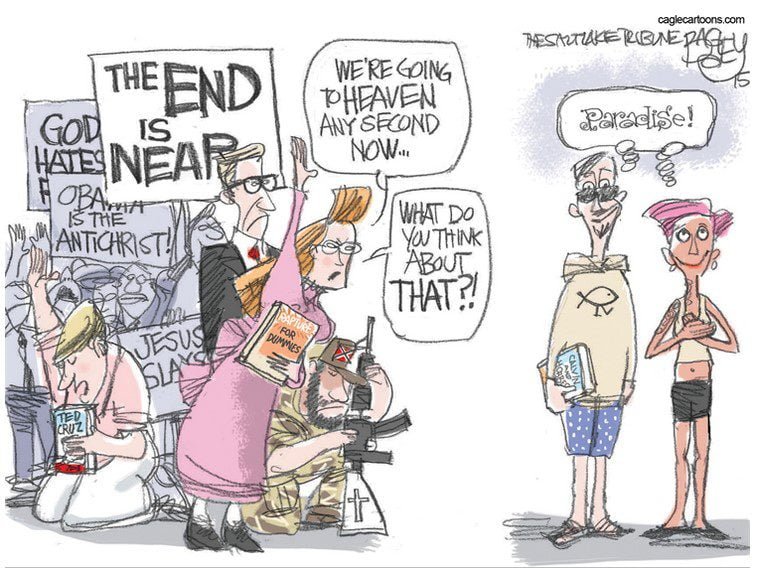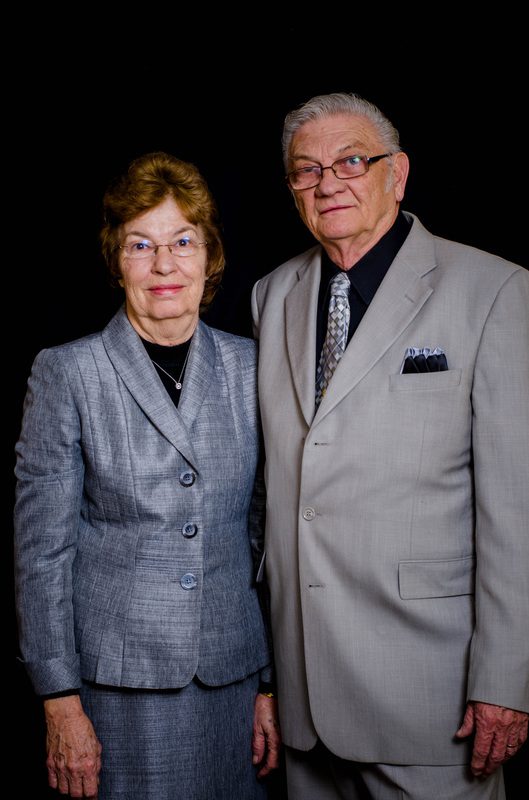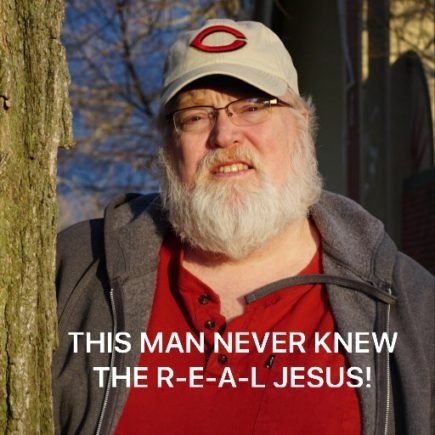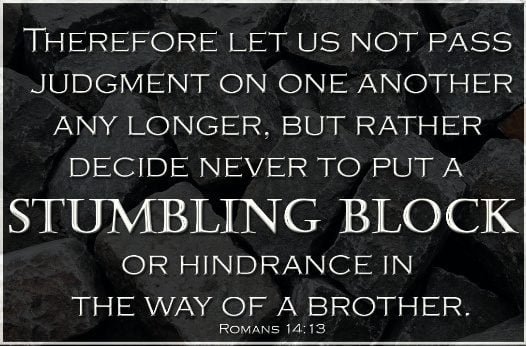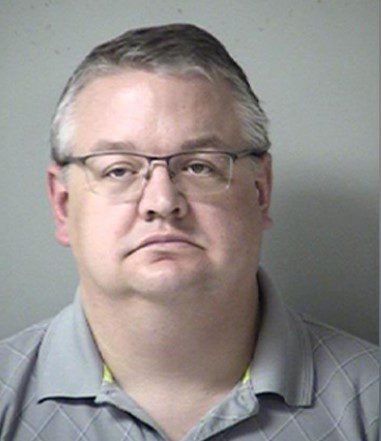
Repost from 2015. Edited, rewritten, and corrected.
Several years ago, a fundamentalist Christian by the name of James commented on several of my posts on this site and on Facebook. James, a seminary-trained Baptist, is convinced I hate God, hate Christians, hate the Bible, and live for the opportunity to mock and ridicule Christianity.
James describes himself this way:
I am a man “of the book.” I am a man of faith. My entire life is governed by my faith in an unseen God. Hebrews 11:6 says “Now faith is the substance of things hoped for, the evidence of things not seen.” My entire life falls under the authority of the Word of God. No surprise there! And because my life is governed by God’s Word, I live a holy and godly life.
According to James, his entire life is under the authority of the inspired, inerrant, infallible Word of God. God said it, and that settles it, and the real problem with atheists such as I is that we refuse to bow before the power and authority of the Bible. “One day,” James warned, “there will be a day of reckoning and judgment by that man (Jesus) whom God hath appointed to be the judge. And on that day, you WILL bow the knee and confess that Jesus Christ is Lord!”
I’m sure James really believes what he is saying. However, does James really govern his life by the word of God? Does he really believe every word in the Bible is pure and true? I’m sure if James reads this post he will shout from the rooftops, I BELIEVE EVERY WORD IN THE BIBLE . . . STRAIGHT FROM GOD’S MOUTH TO MY EAR AND HEART!!!
What follows is how a conversation between Bruce, the atheist, and James, the pastor might have gone . . .
Bruce: Every book, every chapter, every verse, every word?
James: Yes, all 66 books, 1,189 chapters, 31,102 verses, and 788,258 words (King James Bible Statistics).
Bruce: Do you think homosexuality is a sin?
James: Yes, the Bible says in Leviticus 18:22 that homosexuality is an abomination.
Bruce: So, you support the execution of homosexuals? Leviticus 20:13 says homosexuals should be put to death. And Leviticus 20:10 says adulterers should be put to death. Do you support the execution of homosexuals and adulterers?
James: Well, you see . . . that’s in the Old Testament, so those verses are under the Old Covenant. We are under the New Covenant now. Praise God for his grace and mercy!
Bruce: What about the Ten Commandments?
James: Yes, I think the Ten Commandments are the inviolable law of God and are valid for today!
Bruce: But, they are in the Old Testament.
James: Well, you see, the Ten Commandments are the moral law of God and God’s moral law is in force today.
Bruce: All ten commandments?
James: Well, you see, the command to remember the sabbath day and keep it holy is no longer in force.
Bruce: Where does the Bible say it is no longer in force?
James: Well, you see, it doesn’t, but if you take this verse, that verse, and a few others, and put them together with these verses, and then interpret it through the proper theological grid . . . viola! the command to remember the sabbath day and keep it holy is no longer in force.
Bruce: Hmm. I thought the Bible says, I am the Lord and I change not. Doesn’t the Bible say that Jesus is the same yesterday, today and forever? If God is unchanging, why do his laws change?
James: Well, you see . . .
Bruce: Didn’t Jesus say in Matthew 5:17-18: “Think not that I am come to destroy the law, or the prophets: I am not come to destroy, but to fulfil. For verily I say unto you, Till heaven and earth pass, one jot or one tittle shall in no wise pass from the law, till all be fulfilled.” It seems to me that Jesus is saying the law of God is in force (valid, authoritative) until heaven and earth pass away. I just went outside and checked . . . heaven and earth are still here.
James: Well, you see, the Scripture must be rightly interpreted. You are interpreting it incorrectly and that’s why your beliefs are wrong. I interpret it correctly and that’s why my beliefs are right.
Bruce: I thought you were a man of the book, that you stand upon the B-I-B-L-E!
James: I do.
Bruce: Not really. If you were a man of the book, why would you need to interpret it? Aren’t you really saying that you are a man of a certain interpretation and that your interpretation of the Bible is the authority?
James: Pfft. You are putting words in my mouth.
Bruce: Let’s move on to the New Testament.
James: (under breath) Thank you, Jesus!
Bruce: So, you consider all the commands in the New Testament to be true and authoritative?
James: Absolutely!
Bruce: According to the Christian Assemblies International website, there are 1,050 commands in the 27 books of the New Testament. According to what you said previously, do you consider all 1,050 commands authoritative?
James: Yes, they are the Word of God.
Bruce: Do the women in the church you attend speak during the service?
James: That’s a silly question. Of course, they do.
Bruce: I Corinthians 14:34 says, “Let your women keep silence in the churches: for it is not permitted unto them to speak; but they are commanded to be under obedience, as also saith the law.” This verse says women are not permitted to speak in the church.
James: Well, you see, you need to understand the historical and cultural context to properly interpret this verse.
Bruce: So, we are back to interpreting again. I thought you were a man of the book? Shouldn’t someone be able to pick up the Bible, read it, and understand it? If people wanted to be saved, could they just pick up the Bible, read it, and understand what they need to do to be saved?
James: Absolutely! I hand out tracts with Bible verses on them. If a person reads these verses, they will know all they need to know about being saved.
Bruce: Hmm . . . okay. Does a person need to be baptized to be saved?
James: Absolutely not! That’s works salvation. Salvation is by faith through grace, not of works, lest any man should boast. Praise Jesus!
Bruce: Doesn’t Mark 16 say he that believeth and is baptized shall be saved?
James: Well, you see . . .
Bruce: Does a person receive the Holy Spirit when they are saved?
James: Yes, they do. The Holy Spirit lives in every Christian. He is their teacher and guide! He is the third part of the Godhead.
Bruce: So there are three G . . . (stop, Bruce, stay on point) Sorry about that. If someone is saved, but not baptized, do they have the Holy Spirit living inside of them?
James: Yes, but they should be baptized as soon as possible. Baptism is an outward sign of what God has done on the inside.
Bruce: Doesn’t Acts 2:38 say: “Repent, and be baptized every one of you in the name of Jesus Christ for the remission of sins, and ye shall receive the gift of the Holy Ghost”? This seems to say a person must be baptized before they receive the Holy Spirit.
James: Well, you see, the word “for” in the Greek is “eis” and it means “because of.” In other words, a person is baptized because their sins have been remitted, not in order to have their sins remitted.
Bruce: So, to understand the Bible you need to know Greek?
James: (silence)
Bruce: I thought a person could just read the English Bible and understand how to be saved? Now you are saying they need to understand Greek?
James: Well Greek is the original language of the New Testament.
Bruce: Wait a minute. There’s a Greek New Testament that came before the English New Testament?
James: Yes, and the Old Testament was originally written in Hebrew.
Bruce: So, which words are the pure and perfect Word of God? The English or the Hebrew and Greek?
James: (launches into a long explanation about the original languages and translations)
Bruce: OK, where can I read these original manuscripts?
James: They don’t exist.
Bruce: What do you mean they don’t exist? Doesn’t this mean your faith is in a translation written by men, and not the inspired, inerrant, infallible Word of God?
James: Absolutely not! We can KNOW that the English Bible is the pure and perfect Word of God. God preserves his Word down through the ages.
Bruce: And you know this HOW?
James: The Bible says . . .
I could go on and on and on in endless directions with this fictitious dialog between James and me. As I have easily shown, James’ belief in the Bible requires him to interpret the text, so what is really pure and perfect is not the Bible, but his interpretation. Whatever translation James uses has the fingerprints of man all over it. Since the original manuscripts no longer exist, James can’t be certain that the extant manuscripts contain the exact words of God, and he can’t be certain the translation he uses contains in perfect form the exact words of God. Instead of saying THUS SAITH THE LORD, James should say, THUS SAITH THE IMPERFECT BIBLE, AS INTERPRETED BY JAMES, THE PASTOR.
Bruce Gerencser, 68, lives in rural Northwest Ohio with his wife of 47 years. He and his wife have six grown children and sixteen grandchildren. Bruce pastored Evangelical churches for twenty-five years in Ohio, Texas, and Michigan. Bruce left the ministry in 2005, and in 2008 he left Christianity. Bruce is now a humanist and an atheist.
Your comments are welcome and appreciated. All first-time comments are moderated. Please read the commenting rules before commenting.
You can email Bruce via the Contact Form.

